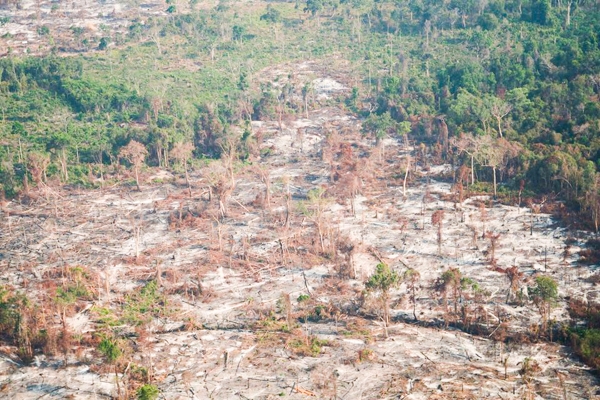BY JONATHAN GREIG AND PAV SUY
The Environmental Investigation Agency (EIA) released a report this week saying Cambodia is in direct violation of a UN treaty due to the increased logging and export of rosewood.
Siamese rosewood, designated an endangered species by the UN due in part to the voracious appetite for it in China, is protected under the UN Convention on International Trade in Endangered Species (CITES).
While the CITES Appendix II protection for Siamese rosewood took effect in March 2013, during the first 18 months of its enforcement Cambodia continued to export copious amounts of the wood, with more than 12,000 cubic meters of Siamese rosewood being given legal permits for export from the Kingdom between June 2013 and December 2014.
“In one year alone, Laos and Cambodia appear to have harvested and exported a volume equivalent to the largest known population of Siamese rosewood remaining in the world,” the report said.
Wood species with CITES designation are not necessarily banned from international trade, but their export must be authorized by a country only if “relevant authorities are satisfied trade will not be detrimental to the survival of the species in the wild and that the timber is legal,” the report added.
Prime Minister Hun Sen doubled down on the CITES designation for rosewood, telling neighboring countries in 2013 that the trade and distribution of rosewood had been banned, while imploring them to stop buying rosewood from Cambodia.
In January and April in 2014, the EIA specifically asked Cambodia whether it had issued CITES export permits, to which it said it had not. But the CITES database showed that other countries had imported 964 cubic meters of wood from Cambodia at that point. With no legal source of rosewood, it is unclear how legitimate, government-stamped wood could have been exported.
The EIA said the CITES permits given to the 964 cubic meters of rosewood were “either incorrectly or illegitimately” handed out.
The exports, despite flouting Mr. Hun Sen’s ban, would have been accepted internationally if Cambodia had done its own survey of the amount of rosewood left in the country and decided the amount did not threaten their existing stock. But no survey has ever been done, and when asked, the spokesman for the Ministry of Environment even questioned why anyone would want to know the size of the country’s rosewood timber stock.
“We will never evaluate the amount of rosewood in terms of hectares because everything is mixed in together,” ministry spokesman Sao Sopheap said. Despite the specific requirements laid out in the CITES designation, Mr. Sopheap continued to ask why it was necessary to know how much rosewood was left in the Kingdom.
Mr. Sopheap’s comments fall in line with what the EIA said in their report: “Neither Laos nor Cambodia have credible inventories of remaining populations to justify any exports at all, or likely any evidence of legality, as required under the convention.”
EIA Senior Forest Campaigner Jago Wadley said Mr. Sopheap’s response “would appear to confirm our allegations that Cambodia does not have even an indicative inventory of Siamese rosewood stocks, and that it cannot have conducted the legally-required NDF [Non-Detriment Findings], and that it has therefore structurally violated CITES rules when issuing CITES export permits for 12,000 cubic meters of the species.”
“The EIA believes that Cambodia has only issued CITES export permits for Siamese rosewood because it is happy to violate, ignore or abuse a UN treaty, and is willing to use that UN treaty to falsely legitimize the illegal timber trade,” Mr. Wadley added. “We believe the CITES export permits should not have been issued, and suspect corruption and a rule of law defect in the country are causal factors.”
In terms of the permits that were issued for exported rosewood, Mr. Sopheap told Khmer Times to contact the Ministry of Agriculture, which did not respond to requests for comment.
He went on to tout the government’s efforts to create protected areas and set up patrols to combat illegal loggers, ignoring questions about why and how more than 12,000 cubic meters of rosewood were given permits for export.
The EIA was harsh in their condemnation of Cambodia’s actions, and said appropriately tough legislation was needed to force Cambodia into compliance.
“Laos and Cambodia have systemically disregarded the most basic legal safeguards of UN trade rules for endangered species in ways that seriously undermine the credibility of CITES, while edging Siamese rosewood ever-closer to extinction,” Mr. Wadley said. “CITES intervention is urgently required.”
The EIA report calls for an immediate end to any and all rosewood exports until Cambodia can show statistically that any trade of rosewood, much less the massive amount now being conducted, would not be detrimental to the already dwindling stock.
“All the indicators betray a governance culture where the rule of law is replaced by forms of state-sponsored crime in key ministries which influence the implementation of UN treaties such as CITES,” Mr. Wadley said, adding that Cambodia had to conduct “Legality Acquisition” tests on each consignment of timber that was exported, and only issue CITES permits after the wood’s legality had been confirmed.
As there is no legal source of rosewood in Cambodia, this would currently be impossible, he said.
“Cambodia also needs to clamp down on the forms of cronyism and corruption that have resulted in well-connected individuals being given extraordinary access to illegal timber stockpiles in the country, in ways that make it look like a governance black hole.”
http://www.khmertimeskh.com/news/26627/rosewood-exports-violate-un-treaty--org/
